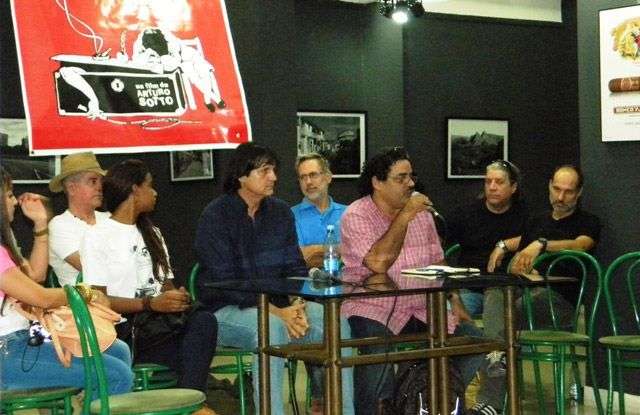Everyone has secret story to tell, reads the slogan of Boccaccerías Habaneras, the latest film by Arturo Sotto, which will be premiered in Cuba on July 9. It is the first comedy by the producer of Amor Vertical, which nourished from The stories of Decameron, by Giovanni Boccaccio, to present a film full of sensuality, confidence, irreverence and secret passions in an urban environment.
The movie is made up of three independent stories, linked by a main thread: the bedroom of a writer who lost has lost his muse, where people go to share their experiences hoping to become literary characters and get some profits out of it. The three stories are:La historiadeltabaco, Los primos and No te lo vas a creer. Each one has a particular style and visuality thanks to photography and other cinematographic elements. About 50 actors take part in the film, which was shot in quite different locations that range from a circus to a tobacco factory for instance.
The film is rich in intertextual elements and references. As said by its producer it is not the usual light comedy and it reaches the audience after having received two awards in the categories of best script and most popular during the past edition of the International New Latin American Film Festival.
With an excellent structure and a perfect use of expressive resources, the film “aimed at being a beautiful film with a successful aesthetic visuality and image”, noted its director during a press conference with some members of the staff.
This full-length film is similar to Decameron, but it has been adapted to our reality. It is full of love, difficult situations, passion, lust and some malice. Its structure is complex for this genre; the story takes several turns and changes the narrator more than once. It satirizes eroticism, and sets humor over voluptuousness.
“I didn’t set out to producing an erotic movie, but a sensual movie. Even the most erotic scenes convey an internal criticism towards kitsch or grotesque elements. We always tried to portray sensuality and refinement, so that sexual malice would rather be in the spirit of spectators rather than in the movie”, he explained.
Sotto also plays the character of the writer that links the three stories. On this experience and the casting he stated: “I majored on scenic arts at the Higher Institute of the Arts (ISA by its acronym in Spanish). I was an actor and I know how difficult castings are for applicants so I thank them all. I was never chosen in a casting; therefore I decided to become a director to be able to act in my own movies, so I’m quite aware of how actors feel when they are directed”, expressed the director of Pontupensamiento en mi.
Some of the actors that took part in the film shared some comments about the characters they played and their experiences in the film. Patricio Wood noted that the actors worked hard defending their roles and extolled the significance of the movie regarding the rescue of literature, something that Cuban cinema is missing. “Arturo didn’t share with us the whole script, only the particular parts of each character. We were also clear about the genre of the movie we were shooting”, he added.
Spectators get the feeling that it was shot in Havana; the view of the city highlights its beauty. The work by its photography director, Alejandro Perez, was essential; as well as the work by Carlos Urdanivia, arts director, who said:
“From the outline of the script I knew what Arturo was looking for and I started the search for locations. Many of them were spectacular, as the factory, and there were others we had to improve and get some permits. We wanted the film to show a sample of as many possible images of Havana, where the audience would get to see its richness and diversity. We wanted it to include deluxe apartments and humble homes so that every story had its own color and architecture”.
Arturo added that the sound in the film is 90% direct and just as in Boccaccio’s original, women always win. “The film is addressed to all kinds of audience despite the fact that it is not a light comedy. We chose this genre because it doesn’t allow too much invention or speculation with cinematographic resources, so we didn’t have difficult frames, though they weren’t so simple either. Boccaccerías… is addressed to any kind of audience though each spectator will interpret it in accordance with his own experiences and knowledge”, affirmed the filmmaker.










